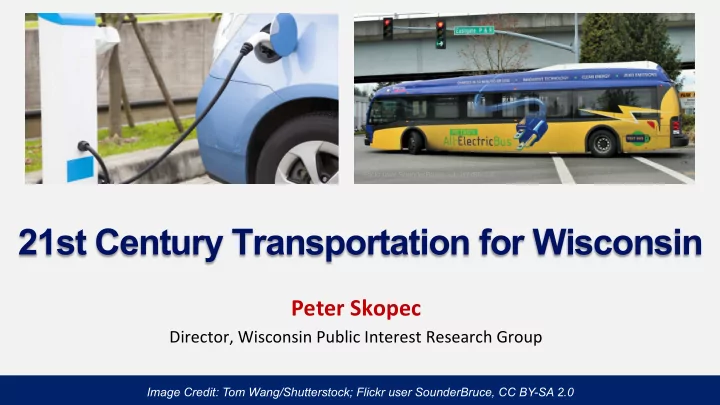

21st Century Transportation for Wisconsin Peter Skopec Director, Wisconsin Public Interest Research Group Image Credit: Tom Wang/Shutterstock; Flickr user SounderBruce, CC BY-SA 2.0
WISPIRG: Grassroots Organizing, Advocacy & Research
The Benefits of EVs: Cleaner Air, Lower Emissions, Consumer Savings • Exposure to diesel soot and ground-level ozone is linked to higher mortality rates. • EVs have half the carbon footprint of gasoline-powered cars over their lifetime. • On average , it costs about half as much to drive an EV as it does to drive a gasoline-powered car. Sources: Union of Concerned Scientists, 2015; Quian Di et al., 2017; Dept. of Energy, 2018; Image Credit: Lorenz Markus Flickr, CC BY 2.0
EV Sales Are at an All-Time High 2016 : +38% 2017 : +32% Source: Veloz, Sales Dashboard, 2018.
Cities Need to Prepare for More EVs Hitting the Road • Madison could see 9,000 EVs on the road by 2030, requiring up to 280 additional public and workplace charging locations. • Milwaukee could have 17,000 EVs on city streets by 2030. Milwaukee will need more than 600 additional public and workplace charging stations by 2030. Calculations based on data from National Renewable Energy Laboratory, U.S. Census Bureau, Dept. of Energy
Estimated # of Public Current # of Public Plugs Plugs Needed by 2030 in City Limits Projected Public & Number of Population Workplace Public Fast Existing Existing Fast City Level 2 Chargers Level 2 (2010 EVs in City Chargers Chargers Needed Chargers Limits by Census) Needed 2030 4,000 144 6 6 104,057 0 Green Bay 2,900 104 4 5 72,623 0 Appleton 2,400 86 4 3 66,083 1 Oshkosh Calculations based on data from National Renewable Energy Laboratory, U.S. Census Bureau, Dept. of Energy
So What Should Communities Do? Improve residential access to on-street charging. Image Credit: Tim Kiser via Wikimedia, CC BY-SA 2.5; Jason Cartwright via Flickr, CC BY 2.0.
So What Should Communities Do? Support public, “semi-public” & workplace charging stations. Image Credit: WISPIRG staff; Nicolas.boullosa, from Flickr, via Wikimedia, CC BY 2.0.
So What Should Communities Do? Incentivize EV parking and charging, and reform parking policies. Image Credit: Vitavia, via Wikimedia, CC BY 2.0; Visitor7 via Wikimedia, CC-BY-SA-3.0.
So What Should Communities Do? Encourage electric shared mobility options like carsharing, ridesharing and bikesharing. Image Credit: Deb Nystrom via Wikimedia, CC BY 2.0; Staff
The Importance of Electric School & Transit Buses • 95% of U.S. school buses , carrying some of the most vulnerable passengers, run on diesel. • More than 60% of U.S. transit buses run on diesel, and another 18% run on natural gas. • Only 0.2% of U.S. buses are all-electric. Sources: Robert Pudlewski, School Transportation News, 4/2017; U.S.DOT, 2017; Image credit: Rockford’s New Country Q98.5 via YouTube (with permission)
All-Electric Buses Are Cleaner, Healthier, Often Cheaper Source: California Air Resource Board, 2017.
All-Electric Buses Are Cleaner, Healthier, Often Cheaper State leaders should use VW “Dieselgate” settlement funds to help transit agencies and school districts buy all-electric buses. Source: Clinton Global Initiative V2G EV School Bus Working Group; National Renewable Energy Laboratory
Electrification Alone Won’t Fix Our Transportation System To create a clean and effective 21 st century transportation system for Wisconsin, we have to get people to drive less. That means: • No new highway expansions • More public transportation • More active transportation (walking, biking etc.) • Compact community development • Smart pricing
Peter Skopec WISPIRG Director (608) 268-1656 peter@wispirg.org
Recommend
More recommend